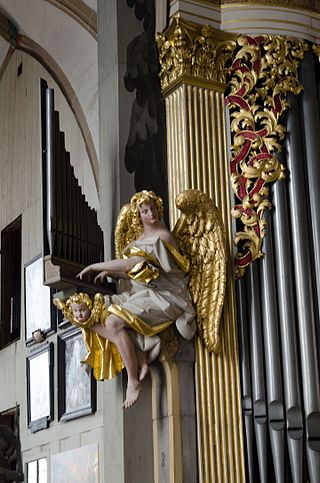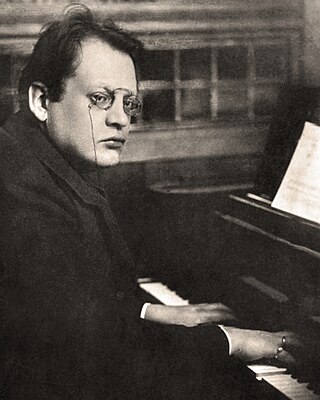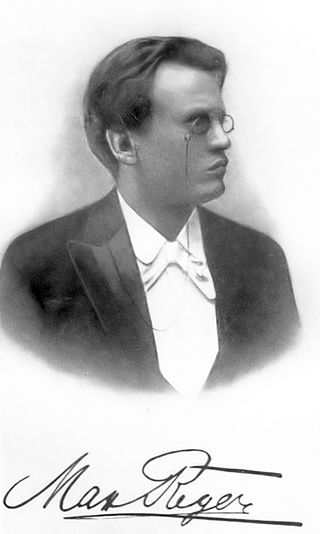
Johann Baptist Joseph Maximilian Reger was a German composer, pianist, organist, conductor, and academic teacher. He worked as a concert pianist, a musical director at the Leipzig University Church, a professor at the Royal Conservatory in Leipzig, and a music director at the court of George II, Duke of Saxe-Meiningen.
Karl Richter was a German conductor, choirmaster, organist, and harpsichordist.

Prelude and Fugue in A minor, BWV 543 is a piece of organ music written by Johann Sebastian Bach sometime around his years as court organist to the Duke of Saxe-Weimar (1708–1713).
Karl Höller was a German composer of the late Romantic tradition.

The Reger-Chor is a German-Belgian choir. It was founded in Wiesbaden in 1985 and has been conducted by Gabriel Dessauer in Wiesbaden. Since 2001 it has grown to Regerchor-International in a collaboration with the organist Ignace Michiels of the St. Salvator's Cathedral of Bruges. The choir performs an annual concert both in Germany and Belgium of mostly sacred choral music for choir and organ. Concerts have taken place regularly in St. Bonifatius, Wiesbaden, and in the cathedral of Bruges in its series "Kathedraalconcerten". The choir performed additional concerts at other churches of the two countries and in the Concertgebouw of Bruges.

Gabriel Dessauer is a German cantor, concert organist, and academic teacher. After studies with Diethard Hellmann and Franz Lehrndorfer, he was responsible for the church music at St. Bonifatius, Wiesbaden from 1981 to 2021, conducting the Chor von St. Bonifatius until 2018. Besides normal church services, he conducted them in regular masses with soloists and orchestra for Christmas and Easter and a yearly concert. In 1995 he prepared the choir for a memorial concert commemorating the 50th anniversary of the end of World War II, performing Britten's War Requiem with choirs from countries involved in the war, and concerts in Wiesbaden and Macon, Georgia. Programs of choral concerts included Hermann Suter's Le Laudi in 1998, the German premiere of Rutter's Mass of the Children in 2004, and the world premiere of Colin Mawby's Bonifatiusmess in 2012 which he had commissioned for the choir's 150th anniversary. The concert of 2008, Vivaldi's Gloria and Haydn's Nelson Mass, was also performed at San Paolo dentro le Mura in Rome.

Arild Edvin Sandvold was a Norwegian organist, composer, and choir conductor.

Der 100. Psalm, Op. 106, is a composition in four movements by Max Reger in D major for mixed choir and orchestra, a late Romantic setting of Psalm 100. Reger began composing the work in 1908 for the 350th anniversary of Jena University. The occasion was celebrated that year with the premiere of Part I, conducted by Fritz Stein on 31 July. Reger completed the composition in 1909. It was published that year and premiered simultaneously on 23 February 1910 in Chemnitz, conducted by the composer, and in Breslau, conducted by Georg Dohrn.

Three chorale fantasias, Op. 52, are chorale fantasias for organ by Max Reger. He composed the fantasias on three chorales in September 1900: Phantasie über den Choral "Alle Menschen müssen sterben", Phantasie über den Choral "Wachet auf, ruft uns die Stimme" and Phantasie über den Choral "Halleluja! Gott zu loben bleibe meine Seelenfreud". They were all first performed individually by Reger's friend Karl Straube, and were first published by Breitkopf & Härtel.

Zwei Choralphantasien, Op. 40, are fantasias for organ by Max Reger. He composed the fantasias in 1899 on two chorales: "Wie schön leucht't uns der Morgenstern" and "Straf mich nicht in deinem Zorn" They were published by Musikverlag Josef Aibl in Munich in May 1900.

Zwölf Stücke, Op. 65, is a group of twelve pieces for organ by Max Reger, composed in Munich in 1902. They were published by C. F. Peters in Leipzig in August of that year, in two books (Heft) of six pieces each.

Zwölf Stücke, Op. 80, is a group of twelve pieces for organ by Max Reger. He composed them in Munich in 1902 and 1904. They were published by C. F. Peters in Leipzig in September 1904.

Ein' feste Burg ist unser Gott, Op. 27, is a chorale fantasia for organ by Max Reger. He composed it in 1898 on Luther's hymn "Ein feste Burg ist unser Gott". The full title is Phantasie über den Choral "Ein' feste Burg ist unser Gott".
Bernhard Haas is a German organist, music theorist and academic.

Sieben Stücke für Orgel, Op. 145, is a collection of seven compositions for organ by Max Reger. He composed the work in three groups in 1915 and 1916. The titles of seven individual character pieces reflect aspects of World War I and Christian feasts. The compositions are based on traditional German hymns, sometimes combining several in one piece. Reger's last work for organ, it was published, again in three installments, in 1915 and 1916.

Heinz Wunderlich was a German organist, academic, and composer. He was known for playing the organ works of Max Reger. He studied in Leipzig with Karl Straube, a friend of Reger. Wunderlich worked as both a church musician and academic in Halle until 1957 when he fled to West Germany and became a church musician and academic in Hamburg. He toured internationally and attracted students from many countries to study with him in Hamburg. After retiring from teaching, he went on to more compositions.
Martin Welzel is a German organist, musicologist, and pedagogue.
Heinrich Weber was a German composer and organist.

Gerard Bunk was a German-Dutch organist, pianist, harpsichordist, choirmaster and composer.










